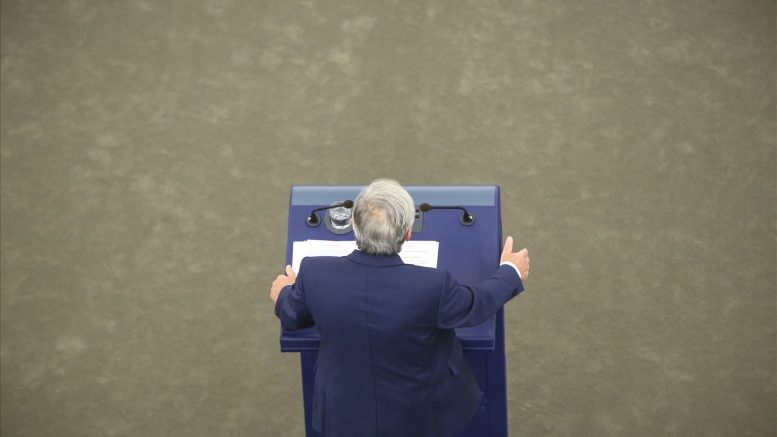Two courtiers – the EU and UK – are competing for Australia’s and New Zealand’s hand in a new trade relationship, Geoff Kitney writes.
It must be reassuring to the Brexit crowd, as doubts about their project grow, to read soothing words from old friends.
A few days ago, in the Financial Times, there was a feature article written by Australia’s High Commissioner to London Alexander Downer dedicated to reaffirming that there was still a very enthusiastic Brexit cheer squad in the “colonies”.
Downer, a former Australian foreign minister and an influential figure among Australian conservatives, gave short shrift to Brexit doubters.
He used some quite old fashioned language to do so, describing the European Union (EU) as “a club” with which a dynamic and open-minded Great Britain had no need of membership.
Downer reasserted that Australia stood ready to play its part in helping Britain along the road to future prosperity outside the “club”. In particular, he strongly reaffirmed that Australia stood ready to be at the front of the queue to do a trade deal with the UK the moment it was free to negotiate.
There was a strong political point to Downer’s article – that doomsayers about Britain’s prospects for going it alone in the world are dead wrong because great trading nations like Australia see a bright future for British trade.
At almost the same time that Downer’s article was being read by FT readers, EU officials in Brussels were briefing correspondents in a language which was very similar to Downer’s.
The message was that the President of the European Commission (EC), Jean-Claude Juncker, in his annual “State of the Union” address to the European Parliament, would be announcing the EU’s plans for an accelerated agenda of trade deals. And at the top of his list of countries for doing a deal with was Australia, together with its near neighbour, New Zealand.
It was a very obvious “up yours” moment in the increasingly tetchy politicking between the EU and the UK.
The symbolism couldn’t have been more striking.
Australia and New Zealand are being caught up in a free trade dating game. Two courtiers are competing for their hand in a new trade relationship.
But the key point in Junker’s speech was that the EU stood ready to begin Free Trade Agreement (FTA) negotiations almost immediately. The UK, on the other hand, will be stuck at the starting line until the Brexit process is completed because it will be bound by EU rules banning member states from negotiating bilateral trade deals with non-EU countries.
Junker, in other words, was saying that by choosing Brexit, Britain would be disadvantaging itself by being forced to wait longer than EU countries for the economic benefits of new trade deals the EU could do with Australia, New Zealand and possibly many other countries.
It was a very obvious “up yours” moment in the increasingly tetchy politicking between the EU and the UK.
Suspicions that this was really only about politics were supported by documents published by the EC which revealed that the value to the European Union of an FTA with Australia would amount to just 0.02 per cent of EU GDP over time, a tiny fractional gain compared to the big political point being made by Juncker.
However, digging deeper into the EC’s briefing papers on the proposal for FTAs with Australia and New Zealand, there were some matters of substance which suggest that, while the deals themselves would make small trade gains, the framework on which they would be built would involve a very significant policy shift which would have big implications for EU trade policy and potentially for international trade.
The EC proposes – as part of the Australian and New Zealand FTAs – the creation of a new international tribunal to settle disputes involving claims by trans-national corporations of damages to their businesses by policy changes by the partner country to any free trade agreement.
The proposed system would replace what are known as Investor-to-State Dispute Settlement clauses that are now common to all FTAs. So far in 2017 there have been 33 FTAs registered with the World Trade Organization and every one includes ISDS clauses. Trade experts say that none of the deals would have been possible without the ISDS clauses.
Consumer activists and interest groups are passionately opposed to ISDS procedures, arguing that it is unconscionable to give global corporations legal power to compromise national sovereignty.
But ISDS clauses are extremely controversial.
They are seen as “sovereignty sapping”, in that they allow big corporations to go to secret tribunals to lodge claims for compensation against the governments that are parties to the FTAs where the corporation believes a policy change by a government has harmed their business. The tribunals include members nominated by the aggrieved corporation and none of their proceedings are open to public scrutiny.
The stand-out example of this was the action taken by the United States tobacco giant Philip Morris against the Australian government over its decision to introduce plain packaging for tobacco products to discourage smoking.
Although the UK is a long way from being able to begin negotiating FTAs, evidence given to House of Commons committees indicates that the British government would include ISDS clauses in any agreements it negotiates.
But consumer activists and interest groups are passionately opposed to ISDS procedures, arguing that it is unconscionable to give global corporations legal power to compromise national sovereignty.
It was this issue that almost derailed the recent EU-Canada free trade agreement, CETA, when activists convinced the Belgian state of Wallonia to veto the agreement if ISDS provisions weren’t removed. Wallonia claimed that the ISDS clauses were in breach of EU law.
Under current EU rules, FTAs have to be approved unanimously by all EU member states and their regional governments.
1/ Today the EU-Canada Trade Agreement enters into force. How will #CETA benefit the EU? #EUtrade pic.twitter.com/VRFC22qIiB
— European Commission (@EU_Commission) 21 September 2017
The CETA impasse was broken when the EU decided to replace the ISDS clauses with a new Investment Court System that would adjudicate foreign corporations’ damages claims against the EU and Canada. The tribunal would be independent and conduct open hearings.
In his trade statement Juncker went further, proposing for all free trade agreements a system of International Arbitration Tribunals as “a new, independent and transparent system for resolving disputes between investors and states”.
“ISDS is dead,” Juncker proclaimed rather dramatically.
There is a catch in this, however.
Juncker is also proposing that, with the new system in place, EU rules requiring the approval of regional and national governments before FTA’s could be finalised would not be necessary and the FTA process would be much less cumbersome.
In doing so, he has created new battle lines over the future of FTAs.
Given that the EU and Australia first launched an initial scoping study for a possible FTA more than two years ago, with limited progress since, the prospect of the finalisation of a deal appears some way off.
But Brexit politics will surely compel the EU to get a deal done before the UK can even begin negotiating. Some fast talking by Juncker with the EU member states is going to be an important test of the EU’s ability to beat the UK at the free trade game.

Headline photo: Jean-Claude JUNCKER, President of the EC – September 13, 2017
SotEU 2017 – Debate on the State of the Union. Strasbourg.
Copyright: © European Union 2017 – Source : EP.




